‘To extinguish their sinister traditions and customs’ – the historic bans on the legal use of the Irish and Welsh languages
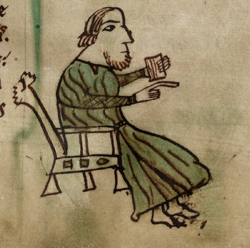
By Pádraig Óg Ó Ruairc.
Constitutionally both Wales and Northern Ireland are considered part of the integral and sovereign territory of the United Kingdom governed by the same legal system.
Yet the use of Welsh, the indigenous language of Wales, is legal in Welsh Courts whilst the use of Irish, the indigenous language of Ireland, is illegal in the courts of Northern Ireland and is a crime punishable by a monetary fine or contempt of court ruling.
The purpose of this brief article is to examine the origins and contemporary effect of the legal prohibitions on the use of indigenous languages within the British courts system, specifically Irish and Welsh, and to examine the current legal status, or lack thereof, of the Irish language in British courts in Northern Ireland.
This article examines the legal prohibitions within the British courts system, on the use Irish and Welsh languages, and to examine the current legal status of the Irish language in British courts in Northern Ireland.
The article will examine The Justice Acts of the 1730s the purpose of which was ostensibly to address the problem supposedly caused by the use of archaic Latin and French terminology in legal proceedings. However the Act had the more practical and punitive effect of criminalising the use of Irish, Welsh and Scots Gaelic in court hearings throughout Britain and Ireland.[1]
The article will also examine the historic and contemporary positions of first Welsh and then Irish within the British legal system and conclude with an analysis of the current difference between the legality of the two languages under British law.
The case of the Welsh language.
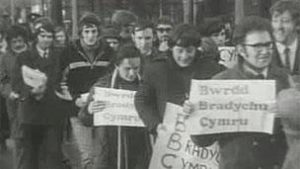
The Laws in Wales Act 1535 decreed that English was to be the only language used in Welsh courts and that monoglot Welsh speakers were barred from holding public office.
The stated aim of the act was to prevent : “the people … using a speech nothing like the natural mother tongue (English) within this Realm … and to extinguish the sinister traditions and customs differing from the laws of this Realm (England).”[2]
The Laws in Wales Act 1535 decreed that English was to be the only language used in Welsh courts and that monoglot Welsh speakers were barred from holding public office.
The passing of The Proceedings in Courts of Justice Act 1730 which forbade any language except English in Court proceedings for a period reinforced the ban on the use of the Welsh language in court cases. Despite this Act being repealed in Britain 1879 the pre-existing 1535 Act remained on the statute book making impossible to use Welsh in legal cases.
The question of the legal status of the Welsh language arose in the 1940s when the British Ministry of Defence evicted sixty-two Welsh speaking families from 65,000 acres of farmland in Mynydd Epynt to create a new training ground for the British Army. When two of the evicted farmers were brought to court in relation to the eviction they asked for, and were granted, permission to give their oral testimony in Welsh. However these defendants were charged a fee for the translation of their evidence into English for its presentation to the court.
This was despite the fact that the case was heard in a Welsh speaking district, and that the court had previously taken evidence from Arabic and Greek speaking witnesses who had not been charged the same fee. The case led to protests by the Welsh language pressure group Undeb Cymru Fydd that eventually resulted in The Welsh Courts Act 1942. This led to a minor change in the law that allowed Welsh monoglots or Welsh speakers with a poor level of spoken English to testify in Welsh. However the act still ensured that the entire court proceedings would otherwise be in English only.[3]
From the 1960s the British government came under severe pressure to repeal the ban on using Welsh in court.
In the 1960s a tide of legal cases, protests and civil disobedience brought pressure on the British Government to introduce an act giving greater language rights to Welsh speakers including protests by Cymdeithas yr Iath Gymraeg (The Welsh Language Society) demanding the use of Welsh in post office services, local court hearings and local Government business. Welsh speakers were issued with fines for completing legal forms in Welsh and for refusing to communicate with British Government officials in English. Many of the protesters refused to pay the fines and were imprisoned.[4]
At the same time as this campaign of civil disobedience the British Government also had growing security and political concerns in Wales: in 1963 the militant group Mudiad Amddiffyn Cymru (Movement for the Defence of Wales) launched a bombing campaign and in a separate development in 1966 Gwynfor Evans was elected the first Member of Parliament for Plaid Cymru.[5]
The British Government bowed to the mounting pressure and, in return for the suspension of Cymdeithas yr Iath Gymraeg’s campaign of civil disobedience, the Ministry for Welsh Affairs established a board under the direction of David Hughes-Parry to “clarify the legal status of the Welsh language and to consider whether any changes should be made in law.”[6]
In response to the Hughes-Parry Report the British Government introduced The Welsh Language Act 1967 which recognised for the first time in principal the status of Welsh speakers under British Law. However the Act was still somewhat restrictive because Welsh speakers would have to notify the court in advance, and neither legal documentation nor legislation would have to be translated into Welsh. [7]
The Welsh Language Act 1993 repealed and replaced both the earlier 1967 Act and the original ban on Welsh in the 1535 Act. The 1993 Act established the right of any person (not just witnesses giving oral evidence) to speak Welsh in court provided they gave adequate notice for an interpreter to be present. This Act also allowed for local courts to develop rules relating to the use of Welsh in courts and made the provision of court documents in Welsh a legal requirement for the first time.[8]
By comparison with the Irish language in Ireland the Welsh language seems to be in much healthier position in Wales. According to the 2011 census approximately 19% of the population of Wales speak Welsh, though only 11% can speak it fluently and the number of native speakers appears to be dropping. The 2016 census for the Republic of Ireland found that 25% claimed to be able to speak Irish but the reality is that this figure is hugely inflated by positive attitudes toward the language held by a significant minority who have an affection for the language cannot necessarily speak it.
The reality is that just 2% of the population of the Republic of Ireland use Irish as a daily community language. And the experience of this author from extensive travels over several years in both Wales and the North of Ireland is that indigenous languages Welsh and Irish are much more widely spoken by young people in parts of Wales and the North of Ireland where those speaking them regard their language as an important badge of political, cultural and national identity to a much greater extent than their contemporaries in the south of Ireland do.
The Irish language case
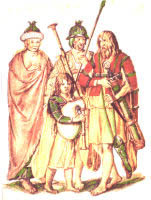
The first British Law enacted in Ireland which specifically banned the use of the Irish language was Article III of The Statute of Kilkenny from 1367 which made it illegal for English colonists in Ireland to speak the Irish language and for the native Irish to speak their language when interacting with them.[9]
This was followed in 1537 with The Statute of Ireland – An Act for the English Order Habit and Language that prohibited the use of the Irish language in the Irish Parliament.[10] In 1541, further legislation was passed which banned the use of Irish in the areas of Ireland then under English rule.[11]
The Administration of Justice (Language) Act (Ireland) was passed by the Irish Parliament in 1737.[12] The Act not only forbids the speaking of Irish within the courtroom, it also prohibits the completion of legal documentation in Irish and imposes a financial penalty of £20 each time Irish is spoken in court in contravention of the law.
The Administration of Justice (Language) Act (Ireland) of 1737 forbids the speaking of Irish within the courtroom, and the completion of legal documentation in Irish and imposes a financial penalty of £20 each time Irish is spoken in court
A notorious example of the Act resulting in a lethal miscarriage of justice is the infamous Maamtrasna Murders case whereby eight Irish speakers were tried for murder in 1882. The majority of the accused were monoglots who spoke so little English that they had difficulty pronouncing their plea of “Not Guilty”. Their solicitor could not speak Irish and a policeman interpreted their evidence into English for the court.[13]
The accused were convicted by perjured testimony and one of them, Maolra Seoighe, was hanged for the crime. In 2011 the British Under- Secretary of State For Prisons stated that Seoighe was “probably an innocent man” but that he would not be seeking a royal pardon for him. On the 4th April 2018 the President of Ireland issued a pardon exonerating Seoighe.[14] [15] Seoighe’s trial took place at a watershed moment in the history of the Irish language a generation after the famine and just prior to the birth of the Irish Revival movement. The level of spoken Irish before the famine stood at about 40% and rapidly declined thereafter.
Notwithstanding the secession of the south of Ireland from the United Kingdom in 1922, the situation regarding the use of the Irish Language in legal cases in Northern Ireland has remained unchanged. About 6% of the population of the North of Ireland speak Irish today, though the overwhelming majority of these speak it as a second language there is a very vibrant Irish language community in urban areas of Derry, Belfast and further afield among young people who view the language as a vital part of their cultural and political identity.
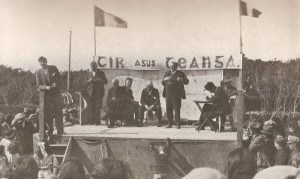
In the 1998 Good Friday Agreement the British Government committed to “recognise the importance of respect, understanding and tolerance in relation to linguistic diversity … including the Irish language”.
This was followed by the 2006 Saint Andrew’s agreement which included plans for an Irish Language Act that would give legal status for the first time to the Irish language within Northern Ireland.[16] However to date there has been no political progress on passing an Irish Language Act.
Shortly after the Saint Andrew’s Agreement, a Belfast Irish speaker Caoimhin Mac Giolla Cathain made a legal application for a drinks licence in Irish, which was refused on the grounds that the application had not been made in English according to the 1737 Administration of Justice (Language) Act (Ireland).
Mac Giolla Cathain made an unsuccessful appeal against the refusal. The judge, Lord Justice Girvan acknowledged that it is legal to use Welsh in Welsh Courts and Scots Gaelic in the Scottish Courts and accepted that the British Government had made a commitment to promote the Irish language in the Good Friday Agreement. However none of this impacted on his final ruling that allowing the use of Irish in the courts of Northern Ireland would “frustrate the interests of justice”.[17]
At present the only legal protection / status which the Irish language has in Northern Ireland comes from the European Charter for Regional and Minority Languages to which the British Government is a signatory. The Charter calls for the promotion of minority languages, the facilitation of their use in public life and “the removal of restrictions which would discourage the maintenance of the language”.[18]
However the impending British exit from the European Union means that the Irish language will soon lose the status which the Charter bestowed on the Language in Northern Ireland. Recently Máirtín Ó Muilleoir, the Sinn Féin politician and former Finance Minister of the Northern Ireland Executive, whose portfolio included responsibility for the regulation of the legal profession, announced that he was planning a new legal challenge to the Act but giving the 2009 ruling against Mac Giolla Cathain this seems unlikely to succeed.[19]
Conclusion
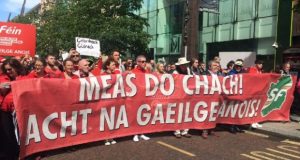
In conclusion there are strong similarities between the historic prohibitions against both the Welsh and Irish languages under British law – both were originally supressed using medieval laws enforced by the English state and in the early 1700’s the prohibitions were reinforced with new more modern legislation.
At the time these Acts were passed English was not a language spoken that was widely spoken or understood by the vast majority of the population of either Wales or Ireland.
There are strong similarities between the historic prohibitions against both the Welsh and Irish languages under British law
It seems clear therefore that the implicit intention of these laws was to promote the Anglicisation of the Welsh and Irish peoples rather than the stated intention of the legislation ie: for the purpose of securing the orderly transaction of court cases in the ‘local vernacular’ language which in all cases was wrongly assumed to be English.
The situation in both Wales and Northern Ireland was comparable until the 1960s when the British Government responded to protests and political pressure in Wales by introducing a series of gradual reforms which continued until 1993 with the passing of the Welsh Language Act and the repeal of the previous anti-Welsh legislation.
For historical, political and cultural reasons too complex and numerous to detail here; there is a far stronger opposition by Unionist majority in Irish in Northern Ireland than there was to the use of the Welsh language by the English speaking majority in Wales. This is evidenced by repeated cuts to Irish language funding and by negative commentary about the Irish language by a number of Unionist politicians including Jim Allister, Gregory Campbell and Edwin Poots.
Consequently, without political agreement on the issue of an Irish Language Act for Northern Ireland the prohibition on the use of the Irish language for legal purposes in Northern Ireland seems set to continue.
Dr. Pádraig Óg Ó Ruairc has a PhD in History and a Certificate in Irish from the University of Limerick. He has written several books on the Irish Revolution of 1913 to 1923 and is a regular contributor to the Irishstory.com
References
[1] www.legislation.gov.uk/aip/Geo2/11/6 (Accessed 31 March 2018)
[2] www.legislation.gov.uk/aep/Hen8/27/26 (Accessed 3-April-2018)
[3] Evans, Gwynfor, The Fight for Welsh Freedom, (Y Llolfa Press, Talybont, 2000), pp 142 -3; www.legislation.gov.uk/ukpga/Geo6/5-6/40/enacted (Accessed 3-April-2018)
[4] Berresford Ellis, Peter, The Celtic Revolution: A Study in Anti-Imperialism (Y Lolfa Press, Talybont, 2000) p.89.
[5] Berresford Ellis, Peter, The Celtic Revolution: A Study in Anti-Imperialism (Y Lolfa Press, Talybont, 2000) p.89.
[6] Ó Neill, Diarmuid, Rebuilding the Celtic Languages – Reversing Language Shift in the Celtic Countries, (Y Lolfa Press, Talybont, 2002) p.50.
[7] Berresford Ellis, Peter, The Celtic Revolution: A Study in Anti-Imperialism ( Y Lolfa Press, Talybont, 2000) pp 89-90, 94.www.legislation.gov.uk/ukpga/1967/66/section/1 (Accessed 3-April-2018).
[8]www.legislation.gov.uk/ukpga_1993_0038/_en.pdf (Accessed 3-April-2018)
[9] Crowley, T., The Politics of Language in Ireland 1366 -1922: A Sourcebook (Routledge, London 2000), p. 15.
[10] Crowley, T., The Politics of Language in Ireland 1366 -1922: A Sourcebook (Routledge, London 2000), pp 21-2.
[11] Crowley, T., The Politics of Language in Ireland 1366 -1922: A Sourcebook (Routeledge, London 2000), p. 19.
[12] www.legislation.gov.uk/aip/Geo2/11/6 (Accessed 31 March 2018)
[13] Waldron, Jarlath, Maamtrasna: The Murders & the Mystery, (de Búrca, Dublin, 1992), pp.56 -57.
[14] Ó Cuirreáin, Seán, Éagóir: Maolra Seoighe 7 dúnmharuithe Mhám Trasna, (Cois Life, Dublin, 2016), p. 154; The Irish Times, 5 April 2018.
[15] President Higgins declared that “the case was one of clearest cases of a miscarriage of justice in British history”. However it is unclear why the President of Ireland should seek to pardon an Irishman wrongfully convicted by the British Crown – presumably the Irish state will follow this act with pardons for the “Gilford Four” and “Birmingham Six”?
[16] Text of the Agreement reached in the Multi-Party Negotiations (1998).
[17] The Irish Times, 2 June 2010; UTV News Report, 2 June 2010.
[18] Mac Giolla Chríost, Diarmait, The Irish Language in Ireland – From Goídel to Globalisation, (Routledge, New York, 2013), p. 182.